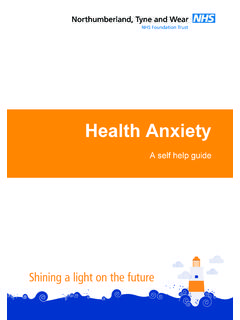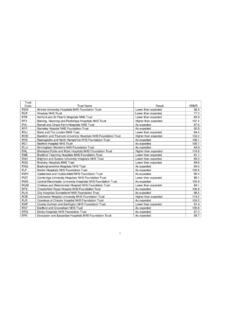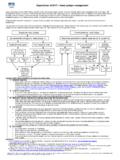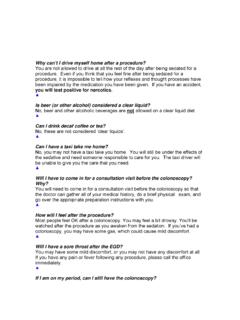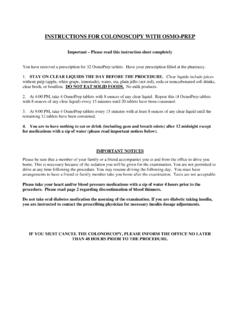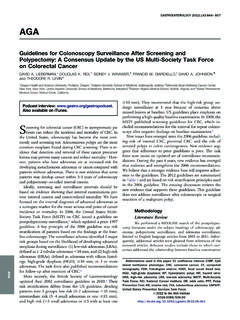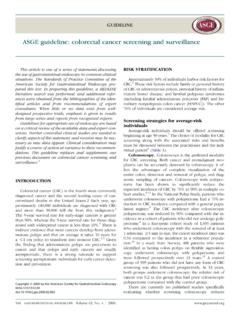Transcription of Having a colonoscopy - NHS
1 NHS Bowel Cancer Screening Programme Bowel scope screeningHaving a colonoscopy2 You have been invited to have a colonoscopy because small growths called polyps were found when you had NHS bowel scope screening. This means there is a chance you have polyps further up the bowel as well. A colonoscopy checks further up the bowel. This leaflet gives you information about Having a colonoscopy . About NHS bowel scope screeningNHS bowel scope screening helps prevent bowel cancer. For every 300 people screened, it stops 2 from getting bowel cancer and saves 1 life from bowel cancer.
2 The NHS offers bowel scope screening to all men and women aged bowel scope screening uses a thin flexible tube to find and remove small growths called polyps in the lower part of the large bowel that could eventually turn into cancer. Some people who are found to have polyps during bowel scope screening are offered a bowelSmall bowelAnusOesophagus (gullet)Stomach1 What is bowel cancer?Bowel cancer is the term used for cancer that begins in the large bowel. It is also called colorectal cancer. Bowel cancer often starts from small growths in the bowel called polyps .
3 polyps do not usually cause symptoms but some might turn into bowel cancer if they are not bowel, also known as the intestine, helps to digest the food you eat. After food has gone through the bowel, all that is left is poo. The bowel has two parts the small bowel and the large bowel. The large bowel is coloured pink in the picture cancer is the third most common cancer in the UK. About 1 in every 18 people in the UK will develop it during their lifetime. Both men and women can get bowel cancer. Bowel cancer is more common in older people most people who get it are over the age of 55.
4 People can be at risk of bowel cancer even when nobody else in the family has had is colonoscopy ? colonoscopy is a test similar to bowel scope screening. It checks further up your large bowel than bowel scope screening, and takes a longer time. colonoscopy is done by a colonoscopy specialist (usually a nurse or doctor) at an NHS bowel cancer screening centre. It should take between 30 and 45 minutes, although the whole appointment may take around two colonoscopy , the specialist uses a thin flexible tube (a colonoscope) with a tiny camera on the end to look inside your bowel and remove any small growths called polyps .
5 They also use the colonoscope to check the bowel for cancer that has already everybody have a colonoscopy ? Some health problems mean that it might not be possible for you to have a colonoscopy . If this is the case, you will be offered another test instead. The other test will usually be a special type of bowel X-ray called a CT (computed tomographic) colonography. This is a way of checking your bowel for polyps or cancer without putting a colonoscope inside your bowel. If polyps are found during CT colonography, they cannot be removed straightaway.
6 You would need to come back for another appointment to have them does colonoscopy involve?Before Having a colonoscopy , you will be offered a sedative. This is usually given as an injection into a vein in your arm. It is to make the colonoscopy more comfortable and to make you more colonoscopy specialist then puts the colonoscope (thin flexible tube) into your large bowel through your anus and looks inside using the tiny camera. After putting the colonoscope into your bowel, they will gently pump some carbon dioxide gas inside.
7 This opens up the large bowel so they can see the lining of your bowel they find any polyps , they usually remove them straightaway using a tiny wire loop passed through the colonoscope. The colonoscopy specialist may also take a tiny piece of the inside of your bowel (a biopsy) to look at under a microscope. What will happen if I choose to have a colonoscopy ?Before your colonoscopy , you will be invited for an appointment with a Specialist Screening Practitioner (usually a nurse) to talk about Having a colonoscopy . They will: check that colonoscopy is right for you explain what Having a colonoscopy is like and the possible benefits and risks, and listen to any concerns and answer any questions you may have about Specialist Screening Practitioner will give you instructions on how to prepare for colonoscopy .
8 They will also give you a medicine to clear your bowel (a strong laxative) to take the day before your colonoscopy . The bowel needs to be clear so that it can be seen properly during the colonoscopy . 4 Several days before your colonoscopy You will need to avoid some foods. The Specialist Screening Practitioner will give you instructions about this. Arrange for someone to take you home after your colonoscopy as the sedative may leave you day before your colonoscopy Take the laxative to clear out your bowel. The laxative acts very quickly and will give you diarrhoea.
9 You will probably need to poo several times and will want to stay near a toilet. We strongly suggest you stay at home that day of your colonoscopy When you arrive at the NHS bowel cancer screening centre, you will be able to talk to the nurses and doctors about any concerns or questions you may have. They will ask you to put on a hospital gown and lie down on a bed ready to have your your colonoscopy The colonoscopy specialist will tell you whether they removed any polyps or took any biopsies. You will probably feel like resting, so you may want to book the whole day away from your other three weeks of your colonoscopy You will be sent a letter explaining the results of your colonoscopy .
10 Your GP will also get your results. What happens if I choose to have the sedative?The sedative is usually given by injection into your arm and may make you drowsy. You may be less alert than usual for up to 24 hours. So if you have the sedative, it is important that you: don t drive home don t drink alcohol for 24 hours don t make important decisions for 24 hours, and don t operate does it feel like to have a colonoscopy ?Most people feel positive about their colonoscopy (about 89 out of 100). colonoscopy can be painful, which is why you are offered a sedative.



